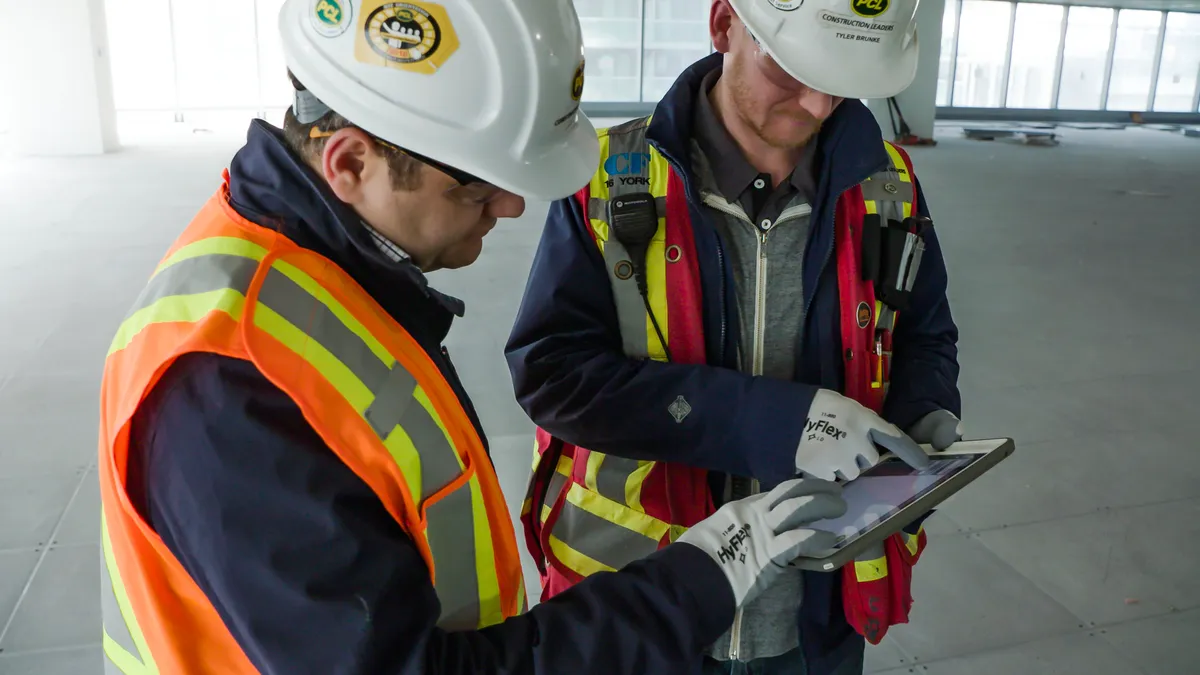A new cloud-based construction management platform is helping one of the country's largest contractors save money, streamline scheduling, minimize rework and reduce environmental impact.
PCL Construction's Job Site Insights (JSI) platform uses sensors to gather and analyze internet of things data straight from a construction site. The devices, which are located on building interiors, equipment and workers, relay data to a dashboard-like program that allows project staff to monitor all aspects of the site.
Using the Microsoft Azure cloud-computing platform, the data is streamed 24/7 to the JSI system, providing construction staff, clients and owners real-time insights through a desktop PC, tablet or mobile device.
The program, which has been used in seven major PCL projects including in California and Orlando, simplifies job monitoring by creating a hub for all of the company's IoT applications, said John Boktor, PCL digital construction manager.
"The idea was that instead of having these four to eight or nine programs running separately why don't we develop our own platform and create a single pane of analytics to put all sources into one place?" he said.
Cloud-based solution
The contractor began rolling out the JSI technology about a year ago, including at 16 York Street, a 33-story office tower project under construction in Toronto. Each floor of the building is equipped with four JSI sensors and one gateway, which relays data from the sensors to the cloud, said Tyler Brunke, PCL superintendent.
The system has provided valuable, in-depth information since construction began, he said.
“We can see any potential issues — flood and leak detection, and temperature and humidity level — before they become a problem and deal with them proactively," Brunke said. "For example, if there’s a threshold set for heating and it’s exceeded, we send a field engineer to investigate.”
During the winter, project managers used data to optimize temperatures for drying of concrete and drywall mud, said Brunke. Painting crews were able to start work three weeks ahead of schedule because the analytics showed superintendents how to optimize heater placements to speed the drying process, Boktor said.
On another project, the SKY Residences project in Edmonton, Alberta, JSI data helped the PCL construction team to cut costs through reduced energy usage. During a string of warm days last winter, the system notified team leaders that the typical 24-hour heater usage was not necessary. Project managers were able to turn heaters off for parts of the day, reducing natural gas heater usage by 46% and electrical heater usage by 58%, saving approximately $250,000 in energy costs according to this company blog.
In addition, the project was completed with no freeze-thaw leak incidents, a rarity for Canadian winter construction.
Other benefits
The sensor-based system could have ramifications for risk management, Boktor said, noting that PCL is in talks with major North American insurance companies to determine how the technology can help reduce liability on construction sites.
"There's potential for both cost savings to the project while it's being built and the owner afterward," he said. "It's just a matter of proving that the platform is continuously monitoring the building and is providing the right data."
PCL will continue to launch the program throughout all of the markets where the company builds, Boktor said, and plans to have JSI in use on about 30 sites by year's end.
"We call it gaining small winds, where you want to start off small, not necessarily in size, but in the sense of picking the proper projects and teams to influence the conversation later on," he said.
The system has been well-received by construction managers and workers, Boktor said, in part because of the peace of mind it provides, especially on cold-weather sites where pipes are prone to freezing.
"You are able to sleep at night knowing you have a device that can give you real time data issues around potential water damage," he said. "That assurance helps our site teams work better."
PCL is exploring the possibility of making the technology available to the wider market, Boktor said, and is also looking at benefits the platform can bring for post-occupancy monitoring by building owners.






















